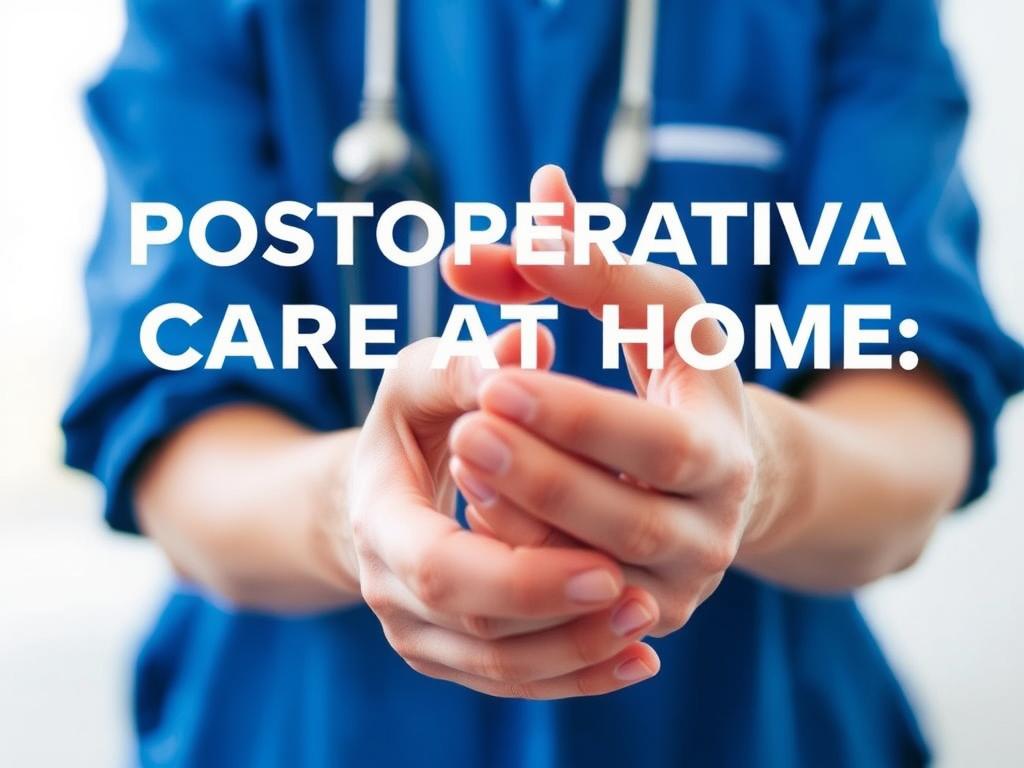Recovering from surgery is a journey that continues long after the hospital doors close behind you. While the medical staff at the hospital does an excellent job preparing patients for discharge, the real challenge often begins at home. Postoperative care at home is a critical phase that can significantly impact your healing process, prevent complications, and improve your overall recovery experience. But what are the essential aspects of this care, and what shouldn’t you overlook?
In this comprehensive article, we’re going to explore everything you need to know about taking care of yourself or a loved one after surgery in the comfort of home. Whether it’s minor surgery or something more major, this guide will provide practical advice, important tips, and key reminders. Let’s dive in together—because proper postoperative care is the foundation of a smooth recovery.
Understanding Postoperative Care: Why It Matters

After surgery, your body is in a delicate state. The wound needs time to heal, your immune system is working hard, and your energy levels might feel lower than usual. Postoperative care is about helping your body get through this period safely and comfortably.
It’s easy to underestimate the importance of home care following surgery, especially when you’ve spent days under attentive medical supervision. However, many complications, such as infections or unexpected pain, arise after discharge. Understanding postoperative care means recognizing these risks and taking proactive steps to manage them.
Postoperative care is not just about physical healing—it also involves emotional support and mental well-being. Being confined to bed or limited in movement can lead to feelings of frustration or depression. That’s why comprehensive care includes addressing mental health and adapting your environment to support your needs.
The Role of Family and Caregivers
One often overlooked aspect of postoperative care at home is the role of caregivers—whether family members, friends, or hired professionals. They provide essential help with tasks such as medication management, wound care, and daily activities.
The presence of a reliable caregiver can significantly ease stress and improve recovery outcomes. For example, you might have trouble bending down to tie your shoes or preparing meals. Having help ensures those needs are met without risking strain or injury.
Beyond practical assistance, caregivers offer emotional support, encouragement, and companionship. This support is invaluable when you’re feeling vulnerable or discouraged during recovery.
Key Components of Postoperative Care at Home
Now that we understand why postoperative care matters, let’s break down the core things you absolutely should not overlook. The following sections will cover wound care, pain management, medication adherence, nutrition, physical activity, and monitoring for complications.
1. Wound Care Management
Taking care of your surgical wound properly is essential to avoid infections and promote healing. Many patients underestimate this task, but it requires attention and cleanliness.
- Keep the Wound Clean and Dry: Follow your doctor’s instructions about when and how to change dressings. Use sterile materials, and always wash your hands thoroughly beforehand.
- Watch for Signs of Infection: Increased redness, swelling, warmth, pus, or a foul smell around the wound are warning signs. Fever and chills may indicate systemic infection and require immediate medical attention.
- Avoid Strain: Don’t stretch or put pressure on the wound area. This helps prevent reopening the incision and allows new tissue to form.
2. Pain Management
Pain after surgery is to be expected, but managing it adequately is crucial—not just for comfort, but also for your ability to move and prevent complications like blood clots or pneumonia.
| Pain Management Method | Description | Important Tips |
|---|---|---|
| Medications (Prescribed) | Includes opioids, NSAIDs, or other analgesics prescribed by your doctor. | Take exactly as directed, never skip doses without consulting your doctor, and be aware of side effects like drowsiness or constipation. |
| Non-Pharmacological Techniques | Use of ice packs, heat, relaxation techniques, or gentle massage around the surgical area. | Use ice in the first 48 hours to reduce swelling; heat can help later but avoid direct heat on open wounds. |
| Physical Activity | Gentle movement can help reduce stiffness and promote circulation. | Follow your surgeon’s advice on when and how to start moving. |
3. Medication Adherence and Monitoring
Postoperative medication isn’t just about painkillers. Antibiotics, anticoagulants, and other prescriptions play a crucial role in healing. Missing doses or stopping medications early can lead to serious complications.
- Follow the Schedule: Use pill organizers or alarms to remember doses.
- Aware of Interactions: Inform your doctor or pharmacist about other medications or supplements you take.
- Keep Track of Side Effects: Report any unusual symptoms like rash, dizziness, or excessive bleeding.
4. Nutrition and Hydration
Good nutrition fuels recovery. Your body needs increased protein, vitamins, and minerals to repair tissues and fight infection.
Eating a balanced diet rich in fruits, vegetables, lean proteins, and whole grains supports healing. Hydration is equally important because it helps maintain circulation, flush out toxins, and keep your energy up.
Foods That Promote Healing
| Nutrient | Source Foods | Benefit |
|---|---|---|
| Protein | Chicken, fish, eggs, dairy, legumes | Supports tissue repair and immune function |
| Vitamin C | Citrus fruits, strawberries, bell peppers | Important for collagen formation and wound healing |
| Zinc | Nuts, seeds, whole grains | Helps with immune response and skin repair |
| Fluids | Water, herbal teas, clear broths | Prevents dehydration and supports metabolism |
5. Physical Activity and Mobilization
You might think rest means staying in bed all day, but early movement is actually one of the best ways to speed up recovery, prevent blood clots, and reduce muscle weakness.
For most surgeries, doctors recommend gradually increasing activity—starting with light walking and simple stretching. Of course, the level of activity depends on your specific procedure and overall condition.
- Don’t push too hard: Listen to your body and stop if you feel dizzy or experience pain.
- Follow Medical Advice: Your doctor or physical therapist can provide a safe rehabilitation plan tailored to you.
- Use Supportive Devices: Crutches, walkers, or braces may be necessary to avoid strain.
6. Monitoring for Complications
Knowing when to seek medical help is vital. Some complications can be emergencies if not addressed promptly.
Common postoperative complications include:
- Infections: Signs include redness, swelling, heat at the wound, fever, or pus.
- Blood Clots: Sudden leg swelling, pain, or shortness of breath require immediate medical attention.
- Respiratory Issues: Coughing, chest pain, or difficulty breathing can indicate pneumonia or other problems.
Environment and Emotional Support: What You Shouldn’t Ignore
Your physical surroundings and emotional state can dramatically influence your recovery. Creating a supportive home environment and addressing mental well-being are important parts of postoperative care that sometimes get overlooked.
Creating a Healing Environment at Home
A comfortable, clean, and safe environment helps reduce stress and prevent accidents. Here are some ways to optimize your space:
- Organize Essentials: Keep medications, water, phone, and necessary supplies within easy reach.
- Maintain Cleanliness: Regularly sanitize surfaces, especially if you have drains or open wounds.
- Prevent Falls: Clear clutter, use non-slip mats, and ensure good lighting to reduce risk.
The Importance of Emotional and Psychological Care
Surgery and recovery can be emotionally challenging. Anxiety, frustration, or feelings of isolation are common. These emotions can affect sleep, appetite, and motivation to follow care plans.
Talking with loved ones, joining support groups, or consulting mental health professionals can make a huge difference. Also, simple practices like mindfulness, meditation, or gentle hobbies can improve mood and reduce stress.
Frequently Asked Questions About Postoperative Care at Home
Patients and caregivers often have many questions about what’s normal during recovery and when to worry. Let’s review some common queries:
| Question | Answer |
|---|---|
| How often should I change my wound dressing? | Follow your surgeon’s instructions; typically daily or when the dressing becomes wet or dirty. |
| Is it normal to have pain weeks after surgery? | Mild pain and tenderness can last several weeks, but severe or worsening pain should be reported. |
| Can I shower with my wound? | Generally, avoid soaking wounds; some surgeries allow gentle showering after the first few days, but check with your doctor. |
| When can I return to work or normal activities? | This varies greatly; your surgeon will give personalized guidance based on your surgery and recovery progress. |
| What should I do if I notice unusual swelling? | Contact your health provider immediately, especially if associated with pain or changes in skin color. |
Tips to Make Postoperative Home Care Easier

Caring for someone or yourself after surgery can be daunting. Here are some practical tips to help:
- Prepare Your Home in Advance: Before discharge, set up a recovery space with comfortable bedding, easy access to essentials, and mobility aids if needed.
- Use a Care Calendar: Track medication times, appointments, and wound care routines to stay organized.
- Stay Connected: Don’t hesitate to reach out to your surgeon, nurse, or pharmacist with questions.
- Practice Patience: Healing takes time; allow yourself or your loved one the grace to recover at a comfortable pace.
- Engage Family and Friends: Delegate tasks and ask for help to avoid burnout.
When to Contact Your Healthcare Provider
No matter how well you care for yourself, there are times when professional medical advice is needed urgently. Don’t delay seeking help if you experience:
- High fever above 38.5°C (101.3°F)
- Severe pain not relieved by medications
- Heavy bleeding or sudden swelling
- Shortness of breath, chest pain, or dizziness
- Signs of wound infection as previously described
Prompt attention can prevent minor issues from escalating into serious problems.
Conclusion
Postoperative care at home is a multifaceted process that combines physical care, emotional support, and proactive management. It requires attention to detail—from wound care and medication adherence to nutrition, movement, and monitoring for complications. The environment at home and mental well-being are equally important factors that influence recovery outcomes.
Remember, recovery is not a race. Listening to your body, following medical instructions carefully, and seeking help when necessary will pave the way to better healing. Whether you are the patient or caregiver, being informed and prepared makes all the difference. With the right care at home, you can successfully navigate the postoperative period and regain your strength with confidence.